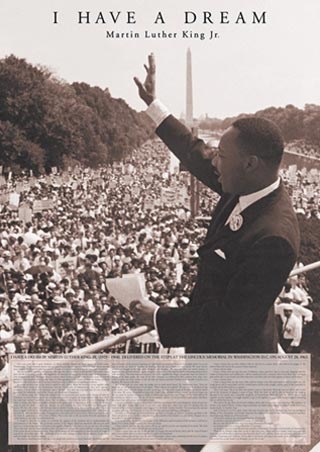

By mid-1963, he’d used the phrase “I have a dream” so often that confidants worried it was making him sound repetitive. Seated nearby was gospel singer Mahalia Jackson, who yelled, “Tell ‘em about the dream, Martin!” Earlier in his career, King had spoken at length about his “dreams” of racial harmony. At first King more or less stuck to his notes, reciting the final written version of his address. But when he finally faced the crowd at the Lincoln Memorial, the reverend went off-book. On the eve of his big speech, King solicited last-minute input from union organizers, religious leaders, and other activists in the lobby of Washington, D.C.’s Willard Hotel. National Archive/Newsmakers/Getty Images

attends a prayer pilgrimage for freedom in Washington. The phrase “I have a dream” wasn’t in Martin Luther King, Jr.’s prepared speech. “From there, a proposed draft took shape.” 3. “A conversation that I’d had with then-New York governor Nelson Rockefeller inspired an opening analogy: African Americans marching to Washington to redeem a promissory note or a check for justice,” Jones recalled in 2011. In mid-August 1963, King asked Jones and Levison to prepare a draft of his upcoming March on Washington address. He also became a frequent intermediary between King and Stanley Levison, a progressive white lawyer who had drawn FBI scrutiny. King’s personal attorney, a trusted advisor, and one of his speechwriters. Nelson Rockefeller inspired part of the "I Have A Dream" speech.įor years, Clarence B. congressman representing Georgia’s fifth district.) 2. Philip Randolph and 23-year-old John Lewis, who was then the national chairman of the Student Nonviolent Coordinating Committee. The list of orators also included labor icon A. King was the lineup’s tenth and final speaker. There at the Lincoln Memorial, 10 civil rights activists were scheduled to give speeches-to be punctuated by hymns, prayers, pledges, benedictions, and choir performances. Organizers hoped the March would draw a crowd of about 100,000 people more than twice as many showed up. was the tenth orator to take the podium that day. Here are some facts about the inspired remarks that changed King's life, his movement, and the nation at large. Martin Luther King, Jr.'s 17-minute “I Have a Dream” address-which was broadcast in real time by TV networks and radio stations-was an oratorical masterpiece. From start to finish, it was a passionate plea for civil rights reform, and one speech in particular captured the ethos of the moment. to participate in an event formally known as the March on Washington for Jobs and Freedom. On August 28, 1963, under a sweltering sun, hundreds of thousands of demonstrators gathered by the Lincoln Memorial in Washington, D.C.


 0 kommentar(er)
0 kommentar(er)
